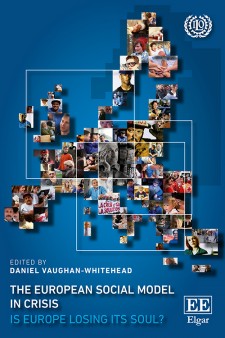단행본
(The) European social model in crisis: is Europe losing its soul?
- 청구기호
- 361.6094 EUR2015 c.2
- 발행사항
- Cheltenham, UK ; Northampton, MA, USA : Edward Elgar Publishing, 2015
- 형태사항
- 627 p
- 서지주기
- Includes bibliographical references and index
- ISBN
- 9789221286554
소장정보
| 위치 | 등록번호 | 청구기호 / 출력 | 상태 | 반납예정일 |
|---|---|---|---|---|
이용 가능 (1) | ||||
| 한국노동연구원 | 00008409 | 대출가능 | - | |
이용 가능 (1)
- 등록번호
- 00008409
- 상태/반납예정일
- 대출가능
- -
- 위치/청구기호(출력)
- 한국노동연구원
책 소개
The European social model—a system that combines economic growth with high living standards and good working conditions—has long been a guideline for setting government policy as well as a source of pride for the EU member nations. However, due to financial strains caused by the economic crisis and long-term social trends, many countries are now looking for ways to cut their most popular social programs.
Using case studies and detailed empirical evidence, this book examines how social policies are being dismantled in 13 EU member states (Estonia, France, Germany, Greece, Hungary, Italy, Latvia, Lithuania, Poland, Portugal, Spain, and Sweden, and the UK). The contributors use the findings from these studies to discuss a mix of policy reforms that could retain the main elements and features of the European social model, thus helping Europe preserve the essentials of its soul and identity.
The volume''s timely warning about the dismantling of the European social model and its possibly devastating future effects—as well as the alternative options proposed—make it essential reading for policymakers and an invaluable reference for scholars and researchers of European studies and social policy.
Contributors include José Ignacio Antón (University of Salamanca, Spain), Dominique Anxo (Linnaeus University, Sweden), Gerhard Bosch (University of Duisburg-Essen, Institut für Arbeit und Qualifikation, Germany) Rafael Muñoz de Bustillo Llorente (University of Salamanca), Kerly Espenberg (University of Tartu, Estonia), Antonio Figueiredo (University of Porto, Portugal), Jérôme Gautié (University of Paris I Panthéon-Sorbonne, Institut des Sciences Sociales du Travail, Centre d''Economie de la Sorbonne), Pilar González, University of Porto, Portugal), Damian Grimshaw, EWERC (European Work and Employment Research Centre, University of Manchester), Maria Karamessini (Panteion University, Greece), Jaan Masso (University of Tartu), Inta Mierina, (University of Warsaw, University of Latvia), Ágota Scharle (Budapest Institute, Hungary), Annamaria Simonazzi (Sapienza University of Rome), Dorottya Szikra (Budapest Institute), and Daniel Vaughan-Whitehead (ILO, Sciences Po).
목차
Forward
1. The European Social Model in Times of Crisis: An Overview (Daniel Vaughan-Whitehead)
2. The Baltic States: Convergence with the European Social Model or Further Liberalisation? (Jaan Masso and Kerly Espenberg and Inta Mierina)
3. France’s Social Model: Between Resilience and Erosion (Jérôme Gautié)
4. The German Welfare State: From an Inclusive to an Exclusive Bismarckian Model (Gerhard Bosch)
5. The Greek Social Model: Towards a Deregulated Labour Market and Residual Social Protection (Maria Karamessini)
6. Recent Changes Moving Hungary Away from the European Social Model (Ágota Scharle and Dorottya Szikra)
7. Italy: Continuity and Change in Welfare State Retrenchment (Annamaria Simonazzi)
8. The European Social Model in a Context of Crisis and Austerity in Portugal (Pilar González and António Figueiredo)
9. Turning Back before Arriving: The Weakening of the Spanish Welfare State (Rafael Muñoz de Bustillo and José-Ignacio Antón)
10. The Swedish Social Model: Resilience and Success in Turbulent Times (Dominique Anxo)
11. Britain’s Social Model: Rapid Descent from ‘Liberal Collectivism’ to a ‘Market Society’ (Damian Grimshaw)
Index



